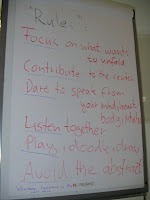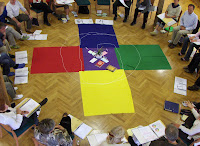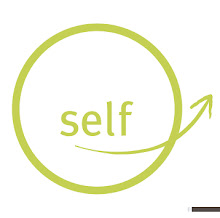
WeissSee°2250 Ideencamp, Rudolfshütte, 10.9.-13.9.2007
Um die Mittagsstunde des 10. September erreiche ich nach S-Bahn, Flughafenshuttle, Flugzeug, Bus, Jugendherberge, Regionalbahn, Schmalspurdiesellok, Ford Transit, Gondellift, etwa 900 km und fast 24 Stunden auf der Strecke die Rudolfshütte am WeissSee.
Die Sonne scheint, der Himmel ist so blau wie er nur in den Bergen ist und überall liegt tiefer Schnee. Ein idealer Ort, um sich zu zentrieren und fokussiert über das nachzudenken, wofür wir alle gekommen sind: die (Weiter)entwicklung unserer Ideen.
Mit mir kommen im Laufe des Nachmittags noch 15 andere junge Kreative an. Gemeinsam treffen wir auf die drei Organisatoren, die neun Experten, unsere Entspannungstrainerin und unseren wunderbaren Fotografen, mit denen wir die nächsten Tage verbringen werden.
Nach einem lockeren Kennenlernen und einigen Gruppenfotos auf der Terrasse des Hauses vor atemberaubender Bergkulisse beginnen wir ohne Zögern das Programm mit einer Übersicht über die nächsten Tage sowie einer angeregten Debatte über den Begriff „Nachhaltigkeit“, seinen Umfang, seine Implementierungsmöglichkeiten sowie seine Anwendung in unserer Gesellschaft. Das folgende Abendessen leitet die erste Teilung der Gruppe ein: solche, die bereits eine konkrete Idee haben und solche, die noch eine entwickeln wollen. Für Erstere, darunter mich, gibt es das leicht abgewandelte Speed-Dating: jeder Teilnehmer hat drei Minuten Zeit bei jedem Experten, dann wird gewechselt.
Relativ schnell stellt sich heraus, dass meine Idee bei Weitem nicht so konkret ist wie von mir bisher angenommen. Die wertvolle Runde mit Florian enthüllt noch etwas Anderes: meine Funktion bzw. Rolle in dem Projekt ist mir gar nicht bewusst.
Mit einem ziemlichen Motivationsdämpfer starte ich in den nächsten Tag, in dem es darum geht, die Idee auf Grundlage des gestern gesammelten Wissens zu konkretisieren. Er endet mit einer ersten Vorstellungsrunde, in der mir ein weiteres Mal bewusst wird, dass noch viel Arbeit vor mir liegt.
In einem sehr persönlichen Gespräch entwickeln Hannes T. und ich dann ein kleines Organigramm auf der Grundlage seiner emotionalen Intelligenz und Lebenserfahrung, das mir enorm hilft, mich selbst innerhalb meiner Idee einzuordnen. Die folgenden Gedanken und Überlegungen sowie das Elevator-Pitch-Training mit Christina, Markus und Florian geben weiteren Input bzgl. der Konkretisierung einer Idee und mir die Gelegenheit, meine Gedanken weiter zu kanalisieren und das Unwesentliche auf später zu verschieben.
Der dritte Tag wird für mich der entscheidende: Burkhard stellt seine mit Hannes T. und Hannes O. entwickelte Ideenskizze vor, die ich gewissenhaft ausfülle und dabei wieder mehr über mich, die Idee und die Unwuchten darin lerne. Ein Gespräch mit Burkhard darüber am Abend desselben Tages klärt die Vorgehensweise und die weiteren Schritte in naher und mittlerer Zukunft auf Basis der Skizze und der im Gespräch mit Hannes T. gewonnenen Erkenntnisse. Dazu erarbeiten wir Alternativen zur Umsetzung des umfangreichen Projekts, die ein Netz bieten sollen für den Unterhalt meiner Familie im Falle einer erfolglosen Umsetzung.
Ich entspanne mich etwas, weil ich nun weiß, wer ich in dem Projekt bin, was ich wann zu tun habe und wie die Realisierung dieser Idee in den nächsten Jahren aussehen könnte, ohne dass ich mich mit allem, was ich habe, daran festkralle. Florian kommt mir in den Sinn, der am Vortag sagte: „Die größte Stärke eines Entrepreneurs ist es, seine Idee bewusst an den Nagel zu hängen.“ Nun, mit einem vernünftigen Plan zur Herangehensweise der Umsetzung und handfesten Alternativen für deren Scheitern geht es mir doch um Einiges besser.
So stellt sich für mich am Abschiedstag denn auch heraus, dass das Camp genau das war, was meiner Idee zu diesem Zeitpunkt ihrer „Mensch“werdung gefehlt hat. Besonders zu nennen ist hierbei die Arbeit mit den Experten Florian Moritz, Hannes Treichl und Burkhard Schneider, die mir bis dato nicht bewusste konkrete Probleme an der Idee herausgefiltert und mit mir angegangen sind.
Neben der Weiterentwicklung meiner eigenen Idee habe ich die Möglichkeit bekommen, an zwei großartigen Projekten mitzuwirken, die die Welt verändern werden. Ich habe mit vielen angenehmen Menschen eine sehr anstrengende, aber gleichzeitig erfüllende und streckenweise auch durchaus sehr entspannende Zeit an einem inspirierenden Ort gehabt und außerdem eine großartige Freundin für’s Leben gefunden.
Bezüglich meiner Erwartungen vor und meiner Empfindungen nach dem Camp kann ich also, verweisend auf mein Interview am ersten Tag, nur sagen, dass ich Recht behalten habe: das Team ist großartig; was es auf die Beine stellt, ist einzigartig. Das Camp war ein Riesenschritt für alle, die ihn zu nutzen wussten und ich bin froh, dass ich diese Community getroffen habe und mit ihnen gemeinsam diese Zeit verbringen durfte. Ich bin zuversichtlich, dass diese Beziehung lang und fruchtbar wird und ich freue mich bereits auf unser nächstes Treffen und auf die nächsten Aufgaben.












